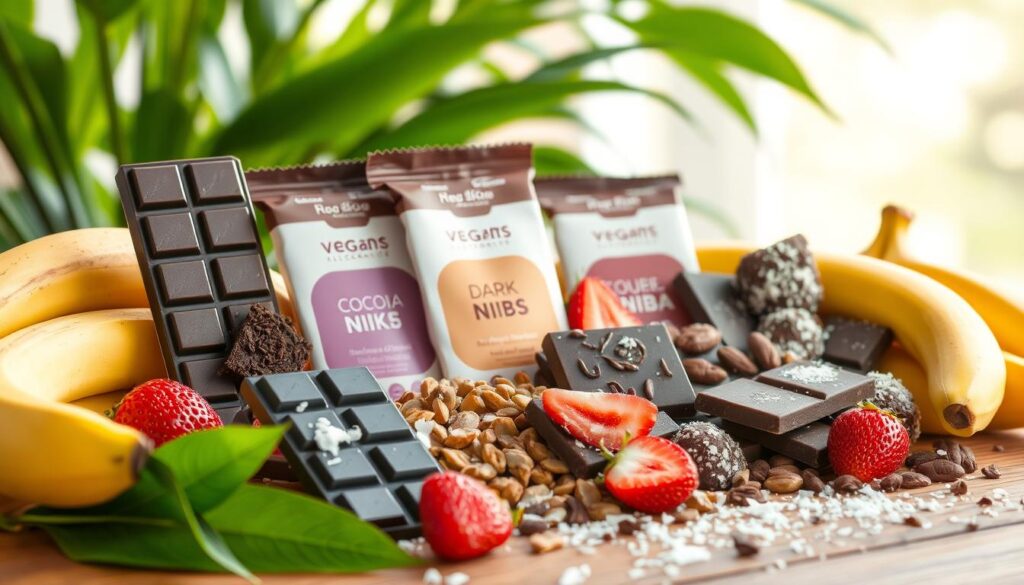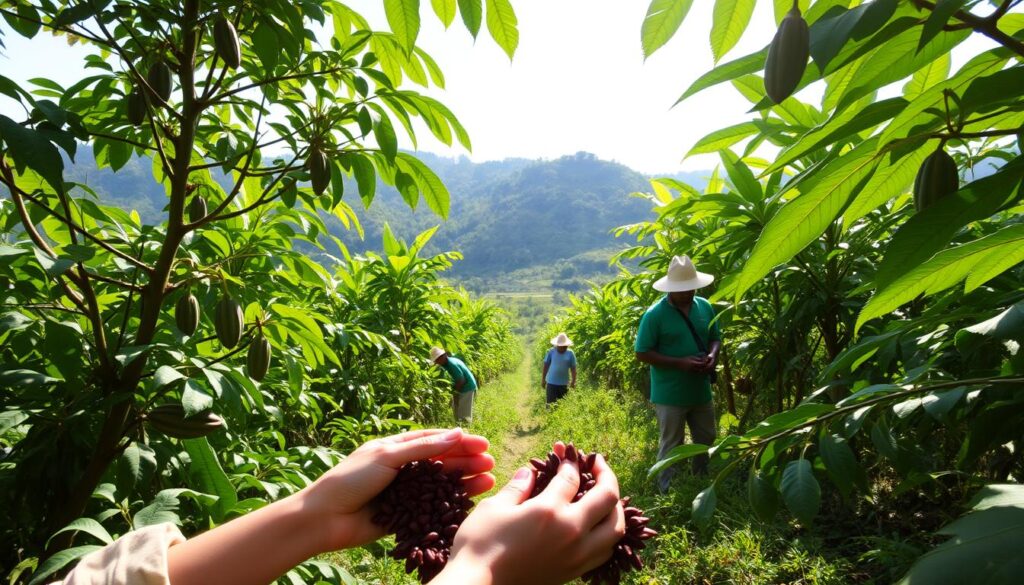
Ever stared at a chocolate bar, wondering if it’s vegan? Black chocolate is a world of delicious complexity. My journey into dark chocolate started with a simple craving and a desire to eat ethically.
Dark chocolate, or black chocolate, is a journey into plant-based indulgence. It spans from ancient cacao farms in Ecuador to today’s vegan chocolate innovations. This guide will explore cocoa nibs and their vegan possibilities.
As more people turn to plant-based diets, knowing about dark chocolate is key. Whether you’re a vegan or just curious about chocolate’s origins, this guide will show you the way to vegan-friendly chocolate.
Key Takeaways
- Pure black chocolate is naturally plant-based
- Cocoa content determines vegan likelihood
- Check labels for hidden animal products
- Vegan dark chocolate options are expanding
- Ethical sourcing matters in chocolate selection
Understanding the Origins of Chocolate
Chocolate’s journey is long and fascinating, starting with ancient civilizations. They first found the magic in cacao beans. Over time, chocolate went from bitter drinks to sweet treats loved worldwide.
Ancient History of Cacao
The tale of chocolate starts in Mesoamerica, where Pre-Olmec cultures grew cacao around 2,500 BC. Archaeology shows us how chocolate was deeply rooted in culture:
- Olmecs first saw cacao’s value between 1,600-400 BC
- Old pottery shows they drank chocolate
- In Aztec times, cacao beans were more precious than gold
From Bitter Drink to Sweet Treat
At first, chocolate was not sweet. The Mayans and Aztecs made a bitter drink called xocolatl. They drank it in rituals and to show status. Aztec ruler Montezuma II drank gallons every day.
“Chocolate is a divine, celestial drink, the backbone of which is cacao.” – Ancient Mayan Proverb
Evolution of Modern Chocolate
When Europeans met cacao, chocolate’s taste changed. Important steps include:
- 1502: Christopher Columbus found cacao beans
- 1828: Dutch method made chocolate easier to mix
- 1847: First chocolate bar was made by J.S. Fry and Sons
- 1876: Milk chocolate was created for everyone
Today, chocolate is a global favorite. It shows how cultures and ideas have mixed over time.
What Makes Chocolate Vegan?
Understanding vegan chocolate is more than just looking at ingredients. Premium chocolate can be vegan if made without animal products. Your journey into plant-based chocolate begins with knowing its main parts.
Most dark chocolate is naturally vegan. Unsweetened chocolate usually has four to five main ingredients:
- Cocoa mass
- Cocoa butter
- Sugar
- Lecithin
- Optional vanilla
When choosing vegan chocolate, be careful of these non-vegan ingredients:
| Non-Vegan Ingredients | Vegan Alternatives |
|---|---|
| Milk | Oat milk |
| Whey | Plant-based emulsifiers |
| Casein | Lecithin |
| Lactose | Natural sweeteners |
“Vegan chocolate celebrates plant-based ingredients while delivering rich, complex flavors.” – Chocolate Expert
High-quality vegan chocolates often have more cocoa (70% or more). This means less sugar and no unhealthy additives. Look for certifications that prove it’s plant-based and ethically sourced.
Your chocolate choices can help your health and the planet. Premium vegan chocolates are tasty and kind to animals, without losing flavor.
Black Chocolate: Components and Production
Exploring the world of gourmet chocolate is a journey from raw cacao to delicious single-origin chocolate. This process is a blend of science, tradition, and cooking skills.
Cocoa Content Percentages
Dark chocolate has cocoa content from 50% to 100%. Each percentage offers a different taste. The higher the percentage, the purer and more intense the chocolate.
Chocolate fans often look for single-origin chocolates. These chocolates show off unique flavors based on their cocoa content.
- 50-65%: Mild and sweet dark chocolate
- 70-85%: Intense and slightly bitter
- 85-100%: Extremely rich and pure chocolate experience
Processing Methods
The chocolate-making process is a delicate art. It turns raw cacao into a luxurious treat. Amazingly, 75% of the world’s cocoa beans come from Africa, with 19% from America.
Every step in production affects the chocolate’s flavor and quality. This makes gourmet chocolate special.
Key Ingredients
The secret of black chocolate is in its simple ingredients. Cocoa butter, the fat from cacao beans, is key for smooth chocolate. Fermentation, lasting 5-7 days, starts within 24-48 hours after opening cacao pods.
“Chocolate is a complex journey of flavor, from bean to bar.” – Artisan Chocolate Maker
| Ingredient | Percentage in Dark Chocolate |
|---|---|
| Cocoa Solids | 50-100% |
| Cocoa Butter | 25-40% |
| Sugar | 0-50% |
Learning about single-origin chocolate opens a world of flavors. Each step in production makes the chocolate you enjoy.
The Difference Between Dark and Milk Chocolate
Exploring chocolate, it’s key to know the difference between dark and milk chocolate. This is important for both chocolate lovers and those watching their health. Dark chocolate, also known as black chocolate, has many differences from milk chocolate.
The main differences are in what they’re made of and how they’re made:
- Cacao Content: Dark chocolate has 55% to 90% cacao. Milk chocolate has 10% to 50%.
- Ingredients: Dark chocolate has cacao beans, sugar, and sometimes vanilla.
- Milk Solids: Milk chocolate must have at least 12% milk solids.
The taste of dark and milk chocolate is very different. Dark chocolate has a complex, bitter taste with fruity and nutty notes. Milk chocolate is smoother and sweeter because of the milk and sugar.
“Chocolate is a complex world of flavors, and the distinction between dark and milk varieties tells a rich story of taste and tradition.”
Dark chocolate is the healthier choice. It has more antioxidants, potassium, zinc, and phosphorus than milk chocolate. Its higher cacao content makes it more nutritious.
| Characteristic | Dark Chocolate | Milk Chocolate |
|---|---|---|
| Cacao Percentage | 55-90% | 10-50% |
| Sugar Content | Lower | Higher |
| Milk Solids | None | Minimum 12% |
If you want a healthier chocolate, dark chocolate is a good choice. It’s rich and intense, with possible health benefits. Whether you like the bitter taste of dark chocolate or the creamy sweetness of milk chocolate, knowing the differences helps you choose better.
Common Non-Vegan Ingredients to Watch For
Exploring bittersweet chocolate can be tricky because of hidden non-vegan ingredients. Even premium chocolate might have animal products in it.
Hidden Animal Products in Chocolate
Dark chocolate often has non-vegan parts. Here are some to watch out for:
- Lecithin from eggs
- Milk to make it less bitter
- Whey protein
- Casein
Controversial Ingredients
Some ingredients are not clearly vegan or non-vegan. For example:
- Bone char processed sugar
- Animal-derived vitamin D3
- Shellac (confectioner’s glaze)
Sugar Processing Concerns
Sugar processing can make chocolate non-vegan. About 15% of processed foods use animal-derived lactic acid. This can affect chocolate too.
“Always read labels carefully to ensure your chocolate meets vegan standards.”
When picking bittersweet chocolate, look for vegan certifications. Choose brands like Enjoy Life Foods or Seed & Bean Organic Dark Chocolate.
Vegan Alternatives in Chocolate Making

Artisanal chocolate makers are changing the game with vegan chocolate. They use plant-based ingredients for a creative twist. This turns traditional chocolate-making into a fun culinary journey.
Plant-based milk alternatives are key in gourmet chocolate. Oat milk is a favorite for its creamy texture and eco-friendly benefits. More and more people want plant-based chocolate options.
“Chocolate is no longer just a dairy product – it’s a canvas for plant-based innovation.” – Vegan Chocolate Expert
Key Plant-Based Milk Alternatives
- Oat milk: Sustainable and creamy
- Almond milk: Light and nutty flavor
- Coconut milk: Rich and tropical undertones
- Rice milk: Neutral and smooth
New vegan chocolate brands are exploring unique ingredients. For example, H!P Chocolate uses oat milk in their bars. Pascha Chocolate offers bars with no sugar, thanks to Stevia.
| Brand | Unique Feature | Milk Alternative |
|---|---|---|
| H!P Chocolate | Sustainable oat milk bars | Oat milk |
| Pascha Chocolate | Zero sugar options | Stevia sweetener |
| Nucao | Reduced sugar content | Plant-based alternatives |
When looking for vegan chocolate, choose brands that care about ethics and use new ingredients. Your taste buds will love these tasty, kind chocolate choices.
Health Benefits of Vegan Dark Chocolate
Explore the amazing world of black chocolate and its health perks. Vegan dark chocolate is more than a tasty snack—it’s a nutritional powerhouse. It offers great benefits for your body and mind.
Antioxidant Powerhouse
Dark chocolate with cocoa nibs is a top antioxidant source. Studies reveal it has more antioxidants than berries, which could slow aging. The cold-pressed cacao powder keeps most nutrients, making it a great choice.
Nutritional Value
- Rich in essential minerals like magnesium, iron, and copper
- Provides substantial dietary fiber
- Contains high levels of flavonols
| Nutrient | Amount per 28g Serving |
|---|---|
| Magnesium | 64 mg |
| Iron | 3.3 mg |
| Fiber | 3 g |
Cognitive Benefits
Black chocolate is great for your brain. Theobromine boosts blood flow to the brain, helping with memory and brain health. Eating dark chocolate with at least 70% cocoa can improve brain function.
“Dark chocolate is not just a treat, it’s a brain-enhancing superfood.” – Nutrition Expert
Experts say eating about 20 grams of vegan dark chocolate daily is best. Choosing high-quality black chocolate with cocoa nibs boosts your health. It’s a delicious way to care for yourself.
Ethical Considerations in Chocolate Production

Exploring single-origin chocolate reveals a complex world of ethics. The chocolate industry struggles with sustainability, labor, and environmental issues.
Key ethical concerns in premium chocolate include:
- Eliminating child labor in cocoa-producing regions
- Ensuring fair wages for farmers
- Protecting environmental biodiversity
- Implementing sustainable farming practices
“By choosing ethically sourced chocolate, consumers can directly impact global agricultural practices.”
Sustainable chocolate tackles big problems. Deforestation is a major issue, with traditional chocolate harming habitats. Craft chocolate, making up about 5% of the market, is driving change.
| Ethical Certification | Average Price Premium | Impact |
|---|---|---|
| Fair Trade Certification | 10% above market rate | Ensures farmer wages |
| Organic Certification | 15-20% price increase | Reduces environmental harm |
Your choices count. High-quality chocolate bars usually cost $10 or more. This reflects the investment in ethical and sustainable production. Supporting brands that value fairness helps change the industry for the better.
When picking single-origin chocolate, seek out certifications. Look for fair trade marks, organic labels, and clear sourcing information.
How to Choose High-Quality Vegan Chocolate
Finding the right artisanal chocolate is a journey. It requires careful thought and knowledge. For those who love vegan chocolate, knowing what to look for is key.
Decoding Chocolate Labels
When looking for vegan chocolate, reading labels is essential. Here are the key things to check:
- Cocoa percentage (ideally 60%-70%)
- Plant-based ingredient list
- No dairy or animal-derived additives
- Transparent sourcing information
Certification Marks to Know
Knowing the right certification marks helps find genuine vegan chocolates:
| Certification | What It Means |
|---|---|
| Vegan Certified | 100% plant-based ingredients |
| Fair Trade | Ethical sourcing practices |
| Organic | No synthetic pesticides |
Quality Indicators for Gourmet Chocolate
Premium artisanal chocolate stands out in several ways:
- Higher cocoa content (70% or more)
- Single-origin chocolate
- Minimal ingredients
- Complex flavor profiles
“The best vegan chocolates tell a story of craftsmanship and ethical production.”
Your chocolate journey should focus on quality, taste, and ethics. By understanding these criteria, you can pick amazing vegan chocolates. They will please your taste buds and align with your values.
Popular Vegan Chocolate Brands and Products
Exploring vegan chocolate opens up a world of tasty options for chocolate fans. You can find everything from unsweetened to bittersweet chocolate. Many brands now offer vegan-friendly choices.
Top vegan chocolate brands are known for their quality and ethical making:
- Hu Kitchen: Offers a complete line of vegan dark chocolate products
- Endangered Species: Donates 10% of net annual profits to wildlife conservation
- Alter Eco: Provides mostly vegan dark chocolate options
- Tony’s Chocolonely: Features multiple vegan dark chocolate varieties
Looking for something special? Here are some great choices:
- Ghirardelli Intense Dark Chocolate (72% cacao content)
- Lily’s Extra Dark Chocolate (minimum 70% cacao)
- Green & Black’s Organic Dark Chocolate
“Vegan chocolate isn’t just a dietary choice—it’s a celebration of ethical and delicious innovation.”
When picking vegan chocolate, look for high cocoa percentages and minimal processing. A 2017 study found that dark chocolate might help lower cholesterol and heart disease risk.
But remember, always check labels. Some brands might add non-vegan ingredients in certain flavors, like caramel or milk.
Conclusion
Exploring black chocolate opens up a world of rich flavors and health perks. Dark chocolate, made from top-quality cacao beans, is more than a sweet treat. It’s packed with nutrients, like magnesium, and antioxidants.
Choosing vegan black chocolate supports sustainable living and health. It can help lower blood pressure and improve brain function. Look for dark chocolate with 70% or more cocoa for the best benefits.
Remember, eating chocolate in moderation is key. Experts say 28g a day is enough for health benefits. Opt for chocolate with high cacao content for the most nutrition. Vegan black chocolate can be a tasty part of a healthy diet.
Now you know how to pick the best dark chocolate. You can choose vegan options that fit your diet and values. Enjoy your chocolate with confidence and care.
FAQ
Is black chocolate automatically vegan?
No, black chocolate isn’t always vegan. Dark chocolate might seem like a good choice, but you must check the ingredients. Some dark chocolates have milk or other animal products, making them not vegan.
What ingredients should I look for to ensure my dark chocolate is vegan?
Look for chocolates with cocoa beans, cocoa butter, sugar, and maybe lecithin. Avoid milk, milk fat, whey, or dairy. Vegan chocolates will say they’re plant-based on the packaging.
Can I find vegan dark chocolate from artisanal or gourmet brands?
Yes, many artisanal and gourmet chocolate makers offer vegan options. They use single-origin cacao beans and alternatives like coconut or almond milk for creamy, dairy-free chocolate.
How can I tell if sugar processing makes chocolate non-vegan?
Some sugars are processed with bone char, an animal product. Choose chocolates with organic or unrefined sugar. Look for brands that say their sugar is vegan. Vegan brands ensure no animal products are used.
Are cocoa nibs a good vegan chocolate alternative?
Cocoa nibs are a great vegan choice. They’re crushed cacao beans with no extra ingredients. They taste intense, are full of antioxidants, and are great in baking, smoothies, or as a topping.
What percentage of cocoa content is best for vegan dark chocolate?
Chocolates with 70% cocoa or more are often vegan. They have fewer ingredients and are less likely to have milk. They also taste richer and might be healthier.
How do I ensure my chocolate is both vegan and ethically produced?
Look for Fair Trade, Rainforest Alliance, or direct-trade labels. These show the chocolate is sourced ethically and farmers are treated fairly. Many vegan chocolate brands also focus on sustainability and ethics.
Are bittersweet and unsweetened chocolates typically vegan?
Bittersweet and unsweetened chocolates are often vegan because they have fewer ingredients. But, always check the label. Some might have milk or other non-vegan additives. Always read the ingredients carefully.

